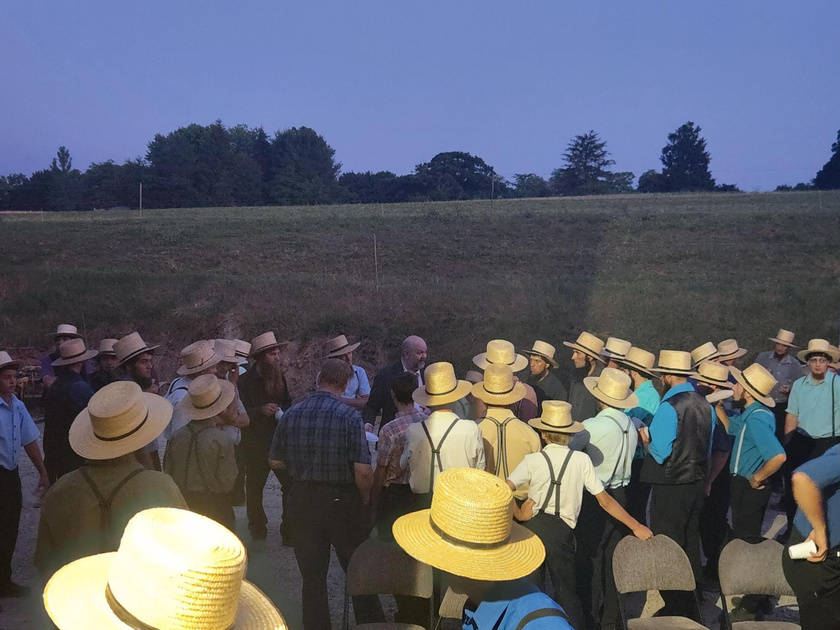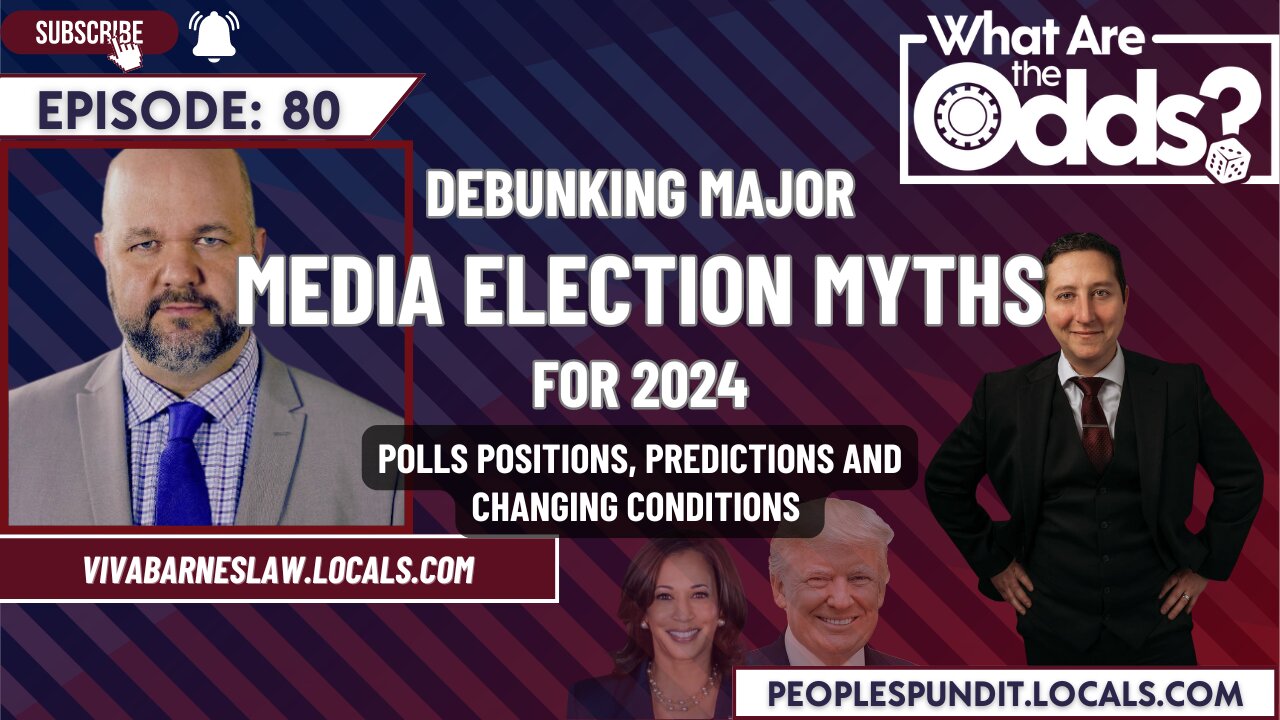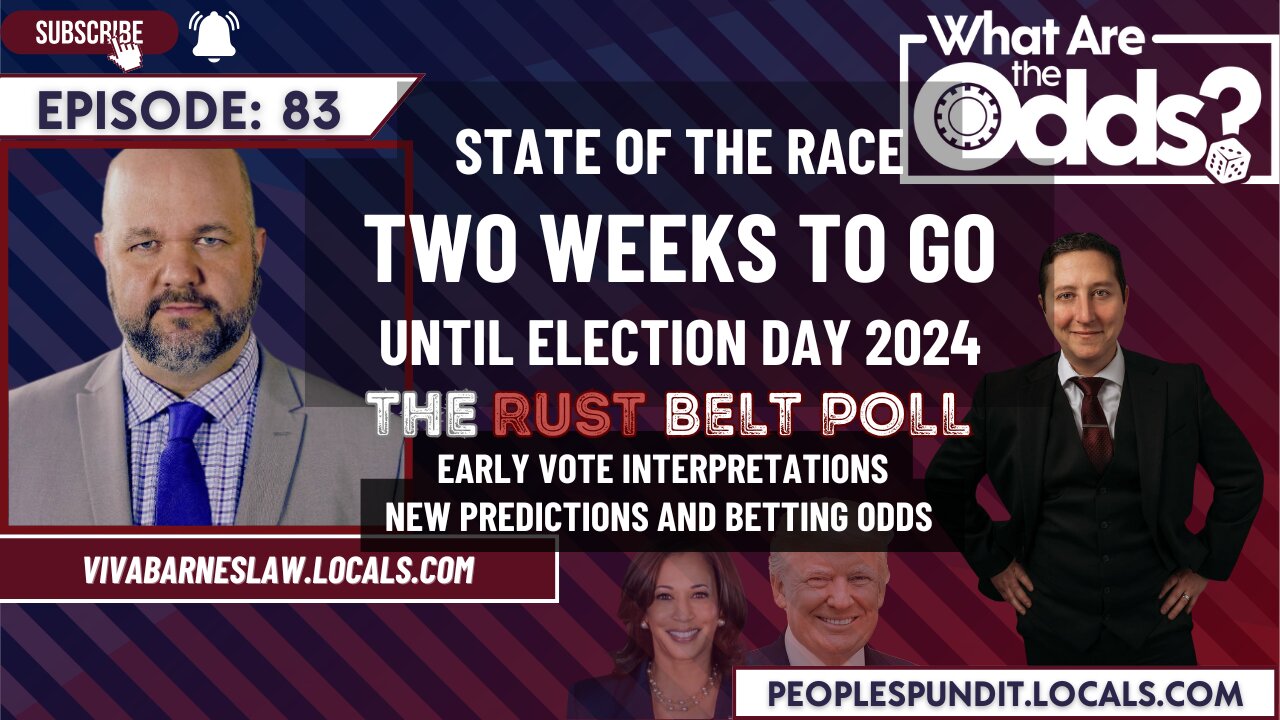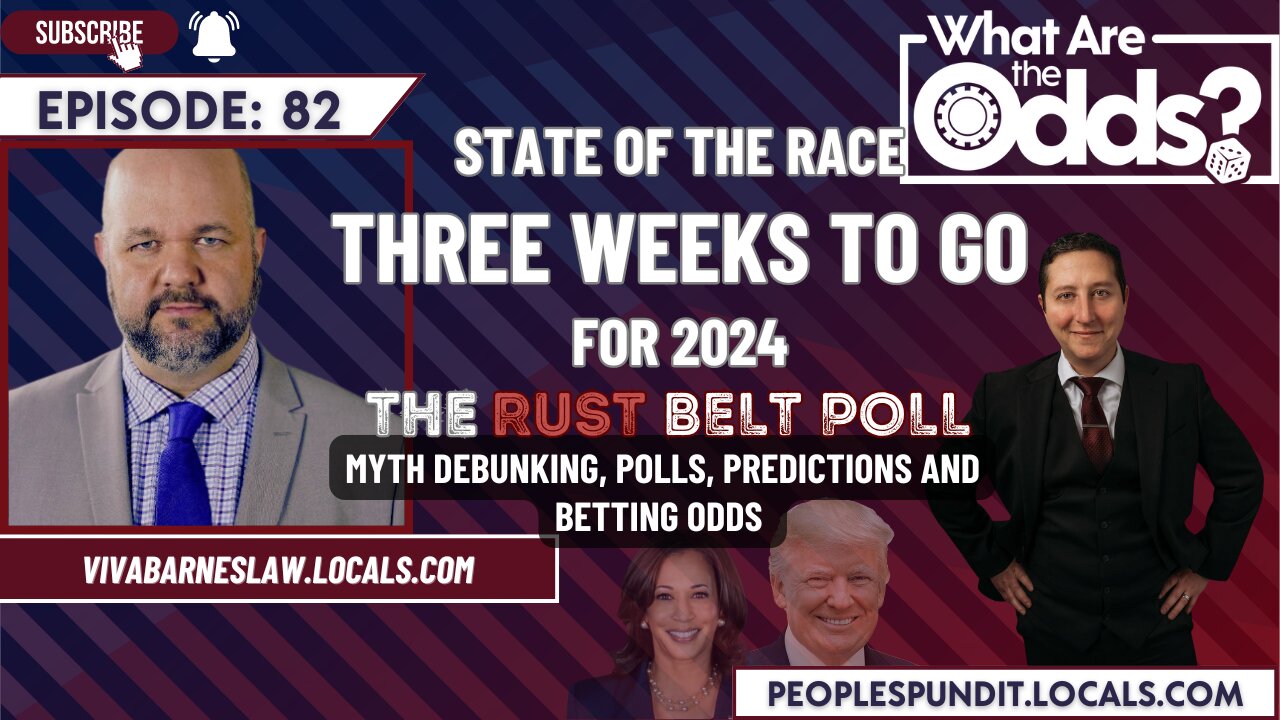
Special Fundraiser!
https://vivabarneslaw.locals.com/post/6190240/fundraiser-for-amos-miller-legal-defense
Schedule: Past & Prospective
Past
What are the Odds w/ Baris:

Barnes Brothers:

Upcoming
- LIVE Friday Night Betting w/ Barnes https://sportspicks.locals.com/post/6190320/live-betting-w-barnes-friday-october-4-2024
- Saturday Movie: TBD
- Sunday: Law for the People w/ Viva
- Tuesday, October 8, Commonwealth Court Amos Miller:
Art of the Day: A day in dairy country, discussing the Constitution with a group of Amish farmers, who showed up by buggy -- at nearly the same time in waves right off the farm, reminiscent of the ending of the film Witness. The Amish took the time for the mass meeting, worried over new state-sponsored threats to their way of life they and their ancestors protected for centuries. The sincerity of their engagement, the honesty of their inquiries, the humility in their approach to life best recollects in living example the ideals and idealism of the best of our founding generation.
Book Recommendation: Remembering the populist revolt after the Revolution that gave us the Bill of Rights. https://www.goodreads.com/book/show/110333.The_Anti_Federalist_Papers_and_the_Constitutional_Convention_Debates
Wisdom of the Day: “The most important things in your home are people.” Amish proverb.
The Merits: Top Five Curated Articles from The Barnes Library
1) Economy: Disastrous response to disaster. https://americanmind.org/salvo/forgotten-america-in-crisis/
2) Politics: Democratic trouble w/ Hispanics. https://www.liberalpatriot.com/p/the-democrats-hispanic-voter-problem-373
3) Geopolitics: Forever war risk. https://archive.is/wgywv
4) History: Pirates lives for freedom. https://www.wpr.org/news/female-pirate-history-wisconsin-maritime-museum-manitowoc
5) Culture: Covid vax ad lies. https://www.realclearinvestigations.com/articles/2024/10/03/nondisclosure_vaccine_ad_blitz_sidestepped_transparency_rules_1062548.html
Homework: 5 Cases TBD on Sunday
I. Tina Peters sentencing. https://x.com/julie_kelly2/status/1842230725061263785
II. Big Pharma conspiracy. https://www.courthousenews.com/wp-content/uploads/2024/10/ag-paxton-insulin-suit-travis-county.pdf
III. EU sues Hungary. https://ec.europa.eu/commission/presscorner/detail/en/ip_24_4865
IV. Seizing internet domains. https://www.courthousenews.com/wp-content/uploads/2024/10/msft-star-blizzard-order.pdf
V. Wizard of Oz. https://www.courthousenews.com/wp-content/uploads/2024/10/wizard-of-oz-dress-decision-second-circuit.pdf
Closing Argument: The Right of Bail Secures Liberty For All
“No freeman shall be taken or imprisoned, or disseised of his Freehold, or Liberties, or free Customs, or to be outlawed, or any otherwise destroyed, but by lawful Judgment of his Peers, or by the law of the Land.”
The Magna Carta, Chapter 29, 9 Hen.3. c.29 (1215).
- Nearly eight centuries old. Films celebrate it; Americans make it political scripture; and the world recognizes it as a revolutionary benefit to a civil and humane society – The Right of Bail.
- As the surety of our liberties, the Bill of Rights provides particular protection before the state cane strips us of our fundamental physical liberty, clothing the accused with the presumption of innocence, prohibiting punishment for past conduct except upon proof admitted under the rules of evidence, properly obtained, to a degree of proof beyond a reasonable doubt, as adjudicated by a jury drawn from the community, and the right to be free pending trial and appeal. The effect of imprisonment cannot be limited to just the effect of the loss of his most inviolate liberty – actual physical liberty; imprisonment also strips a man of so many of his other fundamental rights, such as First Amendment associational rights, Papachristou v. Jacksonville, 405 U.S. 156 (1972), the right to privacy and the integrity of his familial and other relationships, Moore v. East Cleveland, 431 U.S. 494 (1977), and subjects him to some of the most invasive treatment imaginable with minute by minute monitoring, full body searches of genital and anal cavities, and other treatment as if he were close to human chattel, Bell v. Wolfish, 441 U.S. 520 (1979). With an accused often losing their employment, suffering the stigma of potentially weeks or months in prison, often unable to fund or prepare for their own defense, and under the extraordinary stress a prison cell provides, many scholars lament the misuse of detention in district courts. See Craig Ethan Allen, Pretrial Detention and the Loss of Innocence, 11 Hamline L. Rev. 331 (Summer 1988).
- Nowhere is the protection of liberty more important – nor was it of more concern to the Framers – than in the confrontation between the State and the individual when the State attempts to deprive the individual of his or her physical freedom. The Framers recognized that the panoply of protections against government deprivation of liberty contained in the Bill of Rights would be rendered nugatory if a defendant could be interminably incarcerated upon mere accusation. Thus, the Eighth Amendment’s bail guarantee must be seen as part of the Framers’ broader concern, deeply rooted in English and Colonial experience, that no individual be physically detained and restrained by the state except under compelling circumstances.
- The struggle to enwomb individual liberty against the incursions of the state commenced ten centuries ago and has not lost its force with time. After the Magna Carta, securing a man’s liberty but by law of the land and trial by jury of his peers, the sheriffs, kings and courts still searched for and found ways around the guarantee by converting bail provisions into extortion rackets against the poor and imprisoning the politically disfavored under whatever pretext available without accusation and trial. See Duker, The Right to Bail: A Historical Inquiry, 42 Alb. L. Rev. 33 (1977); see also Foote, The Coming Constitutional Crisis in Bail, 113 U. Pa. L. Rev. 959 (1965). Executive branch misappropriation and judicial branch misapplication of bail authority sadly hallmarks the English history of the excessive bail clause.
- This fundamental protection against the state’s most feared power, coterminous with its monopoly on legalized force, derives from the first Anglo-American rebellion against the misappropriation and misapplication of state power, a rebellion that birthed the Magna Carta. The assumption embedded therein was that the law would only allow imprisonment but through the proscription of criminal statutes, as only authorized by the law of the land, and that no criminal conviction could take place, but by a jury. While the ancient English system entrusted the protection of these liberties to the legislative branch of Parliament against the judicial and executive branches, the English Parliament’s abuse of these liberties precipitated the American Revolution, which extended these protections in the federal constitution against all branches of the new national government. See Bridges v. California, 314 U.S. 252, 264-65 (1941). Madison, himself, spoke to this contrast in proposing the Bill of Rights to Congress, in conformity to his and others’ ratification promises to those like George Mason, 1 Annals of Cong. 18, 46-50 (Gales & Seaton ed. 1789-1791): "the declaration of rights which that country [Britain] has established, the truth is, they have gone no further than to raise a barrier against the power of the Crown; the power to legislate is left altogether indefinite .... But although ... it may not be thought necessary to provide limits for the legislative power in that country, yet a different opinion prevails in the United States. The people of many states have thought it necessary to raise barriers against power in all forms and departments of government.”
- The definition of “excessive” for the American revolutionaries was anyone accused of a non-capital offense not made bailable by sufficient sureties, as Pennsylvania so codified in its constitution. Pa. Const. ch. ii, Sec. 28 (1776) (“all prisoners shall be bailable by sufficient sureties unless for capital offenses.”) Congress’s understanding was the same, as it passed the excessive bail clause and the bail provisions of the Judiciary Act of 1789 at the same time, provisions unchanged for nearly two hundred years: an accused shall be admitted to bail in non-capital cases. Indeed, every state admitted to the Union after 1789 (excepting only West Virginia during the days of the Civil War, and Hawaii, at the very end) guaranteed the right to bail for non-capital offenses, while the original colonies who modernized their Constitutions in conformity with the revolutionary principles equally established the same. Note, The Eighth Amendment and the Right to Bail: Historical Perspectives, 82 Colum. L. Rev. 328 (1982). From 1789 to 1966, jurists assumed the protection against excessive bail prevented the state from denying a man’s liberty except in capital cases. See United States v. Motlow, 10 F.2d 657 (1926) (Butler, J., Circuit Justice). The ubiquity of understanding across all the judges confirmed the tradition from its American roots: bail was excessive whenever bail, or the denial thereof, exceeded the state’s interest at issue. The Senior Judges of all federal appellate courts understood the same, as communicated by a then-acting Supreme Court Justice Butler sitting as a Circuit Justice. Upon the recommendation to District Judges by the conference of the Senior Circuit Judges, held in June, 1925, upon the call of the Chief Justice of the United States, under the Act of September 14, 1922 (42 Stat. 838 (Comp. St. Ann. Supp. 1923, Sec. 1113a)), the Senior Circuit Judges advised each of their district courts: “The right to bail before conviction is secured by the Constitution to those charged with violation of the criminal laws of the United States.” Motlow, 10 F.2d at 662 (Butler, J., Circuit Justice). Justice Butler reviewed and concurred, noting the purpose of the clause: [N]o one shall be required to suffer imprisonment for crime before the determination of his case in the court of last resort. And it adopts the substance of the rule laid down by the Supreme Court in Hudson v. Parker. Id. at 662." When misuse of bail again arose, critics condemned it and Congress answered with the Bail Reform Act of 1966. See R. Goldfarb, Ransom–A Critique of the American Bail System, 23-24 (1965). The first Bail Reform Act of 1966 intended to expand, not limit, access to bail, by codifying Constitutional constraints on the perceived judicial misuse of bail.
- Significantly, imprisoning a man prior to trial handicaps his defense by inhibiting his free contact with counsel; preventing him from providing for himself or others financially; exposing him every day to the “prison rats” who often act as government informants to induce, or claim to have induced, incriminating admissions during imprisonment; and lastly, inviting coerced plea dispositions just to avoid the ongoing imprisonment. See Preventive Detention: An Empirical Analysis, 6 Harv. Civ. Rights Civ. Lib. L. Rev. 289, 347 (1971); see also Kinney v. Lenon, 447 F.2d 596 (9th Cir. 1971).Federal courts have long recognized this pernicious effect. See Campbell v. McGruder, 580 F.2d 521, 532 (D.C. Cir. 1978); Motamedi, 767 F.2d at 1414 (Boochever, J., concurring in part and dissenting in part) (“A subtler consequence of pretrial detention is that it may set up a conflict between the defendant’s desire and right to provide himself with the best defense possible and his desire to escape the unpleasantness of pretrial confinement as soon as possible “).
- Bail protects a wide range of critical and essential constitutional rights: “From the passage of the Judiciary Act of 1789 to the present . . . federal law has unequivocally provided that a person arrested for a non-capital offense shall be admitted to bail. This traditional right to freedom before conviction permits the unhampered preparation of a defense, and serves to prevent the infliction of punishment prior to conviction . . . Unless this right to bail before trial is preserved, the presumption of innocence secured only after centuries of struggle, would lose its meaning.” Stack v. Boyle, 342 U.S. 1, 4 (1951). Notably, to some scholars and jurists, as well as to most people on the street, the idea that putting a man in prison is somehow not “punishment” can seem “ludicrous.” United States v. Edwards, 430 A.2d 1321, 1363 (D.C. 1981) (en banc) (Mack, J., dissenting). As the wisdom of the ancients provided: “If it suffices to accuse, what will become of the innocent?” Coffin, 156 U.S. at 455 (1895) (reciting Ammianus Marcellinus, Rerum Gestarum Libri Qui Supersunt, L. XVIII, c. 1, A.D. 359). Bail secures the presumption of innocence.
- We defend the speech we hate because our speech may someday be hated; we defend the right to bail for those we despise because someday we may be the one despised. Defending the right to bail secures our most fundamental liberties from the greatest threat the state can pose to any of us.




















